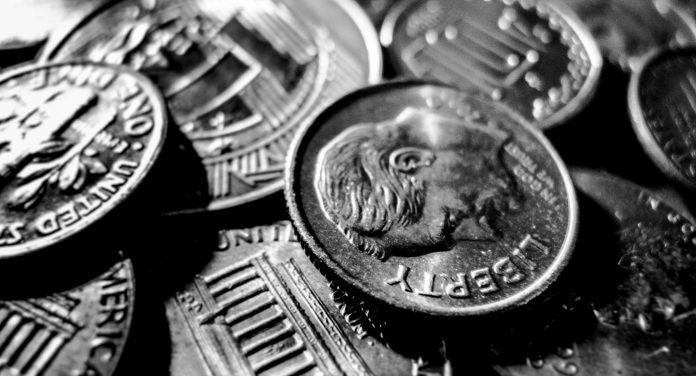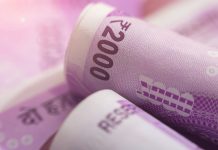The pound slipped from session highs versus the US dollar following the results of the first ballot for UK Conservative leader. Boris Johnson winning by a clear majority pulled the pound from US$1.2707 to close flat on the day at US$1.2680.
| What do these figures mean? |
|---|
|
When measuring the value of a pair of currencies, one set equals 1 unit and the other shows the current equivalent. As the market moves, the amount will vary from minute to minute. For example, it could be written: 1 GBP = 1.28934 USD Here, £1 is equivalent to approximately $1.29. This specifically measures the pound’s worth against the dollar. If the US dollar amount increases in this pairing, it’s positive for the pound. Or, if you were looking at it the other way around: 1 USD = 0.77786 GBP In this example, $1 is equivalent to approximately £0.78. This measures the US dollar’s worth versus the British pound. If the sterling number gets larger, it’s good news for the dollar. |
The pound retreated as news broke that pro-Brexit Boris Johnson convincingly won the first round of votes in the UK Conservative leadership race. Boris Johnson won 114 votes, whilst Jeremy Hunt came in second with 43 votes. Three ministers didn’t gain the 16 votes required to continue to the next round. They were Esther McVey, Andrea Leadsom and Mark Harper.
Boris Johnson was the polls favourite, so yesterday’s result came as no surprise to pound traders. Boris has said that he will take the UK out of the European Union with or without a trade deal on 31st August. His comments had caused the pound to fall as investors grew increasingly concerned over the possibility of a no deal Brexit returning. In Boris Johnson’s most recent speech, he was much less enthusiastic about a no deal Brexit which offered the pound some support.
Today investors will look toward the Bank of England Governor, Mark Carney as he makes a speech in London. Investors will be paying close attention as to whether the central bank is changing its base case assumption that the UK will leave the EU with a deal.
| Why is a “soft” Brexit better for sterling than a “hard” Brexit? |
|---|
| A soft Brexit implies anything less than UK’s complete withdrawal from the EU. For example, it could mean the UK retains some form of membership to the European Union single market in exchange for some free movement of people, i.e. immigration. This is considered more positive than a “hard” Brexit, which is a full severance from the EU. The reason “soft” is considered more pound-friendly is because the economic impact would be lower. If there is less negative impact on the economy, foreign investors will continue to invest in the UK. As investment requires local currency, this increased demand for the pound then boosts its value. |
Dollar Traders Look To Consumer Confidence & Retail Figures
Demand for the dollar was softer on Thursday, as investors grew increasingly convinced that the Federal Reserve would vote to cut interest rates. US initial jobless claims increased by more than what analysts had forecast. The number of claims increased to 222,000, higher than the 215,000 predicted. Economists consider higher jobless claims (the number of people claiming unemployment benefit for the first time) as an early sign of a weakening labour market.
Today there are several key pieces of data that investors will be keeping an eye on. Firstly, retail sales. Analysts are predicting a 0.7% increase in retail sales from April to May. Consumer confidence is the other key release today. These two indicators will provide clues as to how the US consumer is amid the ongoing trade war. A confident consumer and high retail sales could push back expectations of a Fed cut. Weak figures could raise market participant expectations of a cut.
| Why do raised interest rates boost a currency’s value? |
|---|
| Interest rates are key to understanding exchange rate movements. Those who have large sums of money to invest want the highest return on their investments. Higher interest rate environments tend to offer higher yields. So, if the interest rate or at least the interest rate expectation of a country is relatively higher compared to another, then it attracts more foreign capital investment. Large corporations and investors need local currency to invest. More local currency used then boosts the demand of that currency, pushing the value higher. |
This publication is provided for general information purposes only and is not intended to cover every aspect of the topics with which it deals. It is not intended to amount to advice on which you should rely. You must obtain professional or specialist advice before taking, or refraining from, any action on the basis of the content in this publication. The information in this publication does not constitute legal, tax or other professional advice from TransferWise Inc., Currency Live or its affiliates. Prior results do not guarantee a similar outcome. We make no representations, warranties or guarantees, whether express or implied, that the content in the publication is accurate, complete or up to date. Consult our risk warning page for more details.
This article was initially published on TransferWise.com from the same author. The content at Currency Live is the sole opinion of the authors and in no way reflects the views of TransferWise Inc.





